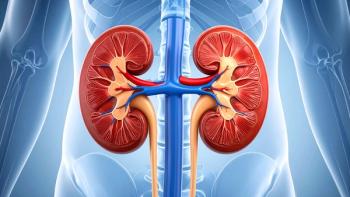
Recognizing the Different Types of Kidney Cancer
Transcript:
Daniel George, MD: Kidney cancer, today, is a growing problem. It’s increasing in incidence. We’re seeing about a 1% to 2% higher incidence of kidney cancer now, each year, and we’re not exactly sure why. We aren’t sure whether there are environmental factors or other factors that are influencing the incidence of this disease, but we’re seeing a higher incidence of kidney cancer than ever before.
Kidney cancer can present in the kidney or can present as a spread to another part of the body. We call that stage 4 metastasis, and that occurs in about 25% of cases. This is actually remarkable, considering that we don’t screen for kidney cancer. We don’t have a mammogram or a PSA (prostate-specific antigen) test for kidney cancer. And yet, most of the time, we diagnosis this when it’s still localized within the kidney. The treatment for localized disease has historically been to either take out the tumor or take out the whole kidney. When we do that, we find that there are different types of kidney cancer.
Most of these kidney cancers are cancers that start in the glandular part of the kidney. This type of cancer is called an adenocarcinoma, but there can be different types of adenocarcinomas. Those different types can be treated in different ways. Most of them are this clear cell type. When we look at it under the microscope, the cells have a clear center to them. That’s where we find some of our traditional treatments for kidney cancer, which target the blood supply to the tumor, to be most effective, but because the other types of kidney cancer are less common, we use those therapies, as well.
You might be asked to participate in a clinical trial. I think it’s a great thing to do. It could benefit you, particularly if you have one of these other types of kidney cancer that we don’t know enough about. There are some newer drugs that are promising against some of the genetics of these other types of kidney cancer. We’ve already got a number of therapies for the clear cell type of kidney cancer, which most patients have.
Many of the patients that present with kidney cancer will present with symptoms. Why is that? Again, we don’t screen for this cancer, so these tumors are allowed to grow. When they grow in the kidney, what are the symptoms that they’re going to cause? The most common symptom is blood in the urine. You may see it, or you may not see it. It may be microscopic. You may feel pain associated with a mass in the kidney. It could feel like a kidney stone from a blood clot forming in the urine or the urinary tract. It may feel like a stone blockage, but it could be caused by a bleeding tumor.
Other symptoms that patients can develop can be less specific—things like weight loss, loss of appetite, or a diffuse kind of flank pain, like pain in the back. You might think it is a muscle pull or something like that. Occasionally, we’ll have patients with kidney cancer present with symptoms from another part of their body—a cough from the lungs or a pain in a bone. Rarely, patients may experience a neurologic symptom. These can all be very worrisome signs. If you have something like that, I recommend that you be seen by your physician. But, in general, most of our kidney cancer patients today present with disease that is still localized in the kidney, and so those localized symptoms—like blood or pain in the flank—are probably still going to be the most common symptoms.
Transcript Edited for Clarity




